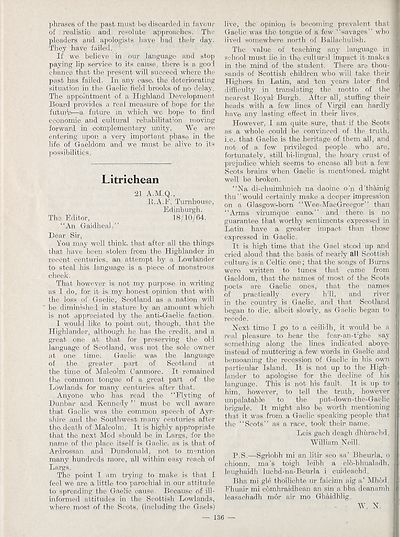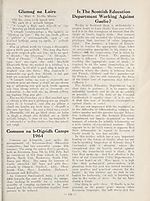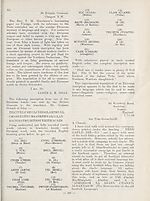An Comunn Gàidhealach Publications > Gaidheal > Volumes 58--62(part), January, 1963--March 1967
(388) Page 136
Download files
Complete book:
Individual page:
Thumbnail gallery: Grid view | List view

phrases of the past must bei discarded in favour
of realistic and resolute approaches. The
pleaders and apologists have had their day.
They have failed.
If we believe in our language' and stop
paying lip service to its cause, there is a good
chance that the present will succeed where the
past has failed. In any case, the deteriorating
situation in the Gaelic field brooks of no delay.
The appointment of a Highland Development
Board provides a real measure of hope for the
futm'e—a future in which, we hope to find
economic and cultural rehabilitation moving
forward in complementary unity. We are
entering upon a very important phase in the
life of Gaeldom and we must be alive to its
possibilities.
Litrichean
21 A.M.Q.,
It.A.F. Turnhouse,
Edinburgh.
The Editor, 18/10/64.
“An Gaidheal.”
Dear Sir,
You may well think, that after all the things
that have been stolen from the Highlander in
recent centuries, an attempt by a. Lowlander
to steal his language is a piece of monstrous
cheek.
That however is not my purpose in writing
as I do, for it is my honest opinion that with
the loss of Gaelic, Scotland as a. nation will
be diminished in stature by an amount which
is not appreciated by the anti-Gaelic faction.
I would like to point out, though, that the
Highlander, although he has the credit, and a
great one at that for preserving the old
language of Scotland, was not the sole owner
at one time. Gaelic was the language
of the greater part of Scotland at
the time of Malcolm Canmore. It remained
the common tongue of a great part of the
Lowlands for many centuries after that.
Anyone who has read the “Flyting of
Dunbar and Kennedy ” must be well aware
that Gaelic was the common speech of Ayr¬
shire and the Southwest many centuries after
the death of Malcolm. It is highly appropriate
that the next Mod should be in Largs, for the
name of the place itself is Gaelic, as is that of
Ardrossan and Dundonald, not to mention
many hundreds more, all within easy reach of
Largs.
The point I am trying to make is that I
feel we are a little too parochial in our attitude
to' spreading the Gaelic cause. Because of ill-
informed attitudes in the Scottish Lowlands,
where most of the Scots, (including the Gaels)
live, the opinion is becoming prevalent that
Gaelic was the tongue of a few “savages” who
lived somewhere north of Ballachulish.
The value of teaching any language in
school must lie in the cultural impact it makes
in the mind of the student. There are thou¬
sands of Scottish children who will take their
Highers tin Latin, and ten years later find
difficulty in translating the motto of the
nearest Royal Burgh. After all, stuffing their
heads with a few lines of Virgil can hardly
have any lasting effect in their lives.
However, I am quite sure, that if the Scots
as a whole could be convinced of the truth,
i.e. that Gaelic is the heritage of them all, and
not of a few privileged people who are,
fortunately, still bi-lingual, the hoary crust of
prejudice which seems to encase all but a few
Scots brains when Gaelic is mentioned, might
well be broken.
“Na di-chuimhnich na daoine o’n d’thainig
thu ’ ’ would certainly make a deeper impression
on a Glasgow-born “Wee-MacGreegor” than
“Arma virumque cano,” and there is no
guarantee that worthy sentiments expressed in
Latin have a greater impact than those
expressed in Gaelic.
It is high time that the Gael stood up and
cried aloud that the basis of nearly all Scottish
culture is a Celtic one; that the songs of Burns
were written to tunes that came from
Gaeldom, that the names of most of the Scots
poets are Gaelic ones, that the names
of practically every h'll, and river
in the country is Gaelic, and that Scotland
began to die, albeit slowly, as Gaelic began to
recede.
Next time I go to a ceilidh, it would be a
real pleasure to hear the fear-an-t:ghe say
something along the lines indicated above,
instead of muttering a few words in Gaelic and
bemoaning the recession of Gaelic in his own
particular Island. It is not up to the High¬
lander to apologise for the decline of his
language. This is not his fault. It is up to
him, however, to tell the truth, however
unpalatable to the put-down-the-Gaelic
brigade. It might also be worth mentioning
that it was from a Gaelic speaking people that
the “Scots” as a race, took their name.
Lets gach deagh dhurachd,
William Neill.
P.S.—Sgrlobh mi an litir seo sa’ Bheurla, o
chionn, ma’s toigh leibh a cl6-bhualadh,
leughaidh luchd-na-Beurla i cuddeachd.
Bha mi gle thoilichte ur faicinn aig a’ Mhbd.
Fhuair mi cbmhraidhean an sin a bha deanamh
leasachadh mor air mo Ghkidhlig.
— 136 —
W. N.
of realistic and resolute approaches. The
pleaders and apologists have had their day.
They have failed.
If we believe in our language' and stop
paying lip service to its cause, there is a good
chance that the present will succeed where the
past has failed. In any case, the deteriorating
situation in the Gaelic field brooks of no delay.
The appointment of a Highland Development
Board provides a real measure of hope for the
futm'e—a future in which, we hope to find
economic and cultural rehabilitation moving
forward in complementary unity. We are
entering upon a very important phase in the
life of Gaeldom and we must be alive to its
possibilities.
Litrichean
21 A.M.Q.,
It.A.F. Turnhouse,
Edinburgh.
The Editor, 18/10/64.
“An Gaidheal.”
Dear Sir,
You may well think, that after all the things
that have been stolen from the Highlander in
recent centuries, an attempt by a. Lowlander
to steal his language is a piece of monstrous
cheek.
That however is not my purpose in writing
as I do, for it is my honest opinion that with
the loss of Gaelic, Scotland as a. nation will
be diminished in stature by an amount which
is not appreciated by the anti-Gaelic faction.
I would like to point out, though, that the
Highlander, although he has the credit, and a
great one at that for preserving the old
language of Scotland, was not the sole owner
at one time. Gaelic was the language
of the greater part of Scotland at
the time of Malcolm Canmore. It remained
the common tongue of a great part of the
Lowlands for many centuries after that.
Anyone who has read the “Flyting of
Dunbar and Kennedy ” must be well aware
that Gaelic was the common speech of Ayr¬
shire and the Southwest many centuries after
the death of Malcolm. It is highly appropriate
that the next Mod should be in Largs, for the
name of the place itself is Gaelic, as is that of
Ardrossan and Dundonald, not to mention
many hundreds more, all within easy reach of
Largs.
The point I am trying to make is that I
feel we are a little too parochial in our attitude
to' spreading the Gaelic cause. Because of ill-
informed attitudes in the Scottish Lowlands,
where most of the Scots, (including the Gaels)
live, the opinion is becoming prevalent that
Gaelic was the tongue of a few “savages” who
lived somewhere north of Ballachulish.
The value of teaching any language in
school must lie in the cultural impact it makes
in the mind of the student. There are thou¬
sands of Scottish children who will take their
Highers tin Latin, and ten years later find
difficulty in translating the motto of the
nearest Royal Burgh. After all, stuffing their
heads with a few lines of Virgil can hardly
have any lasting effect in their lives.
However, I am quite sure, that if the Scots
as a whole could be convinced of the truth,
i.e. that Gaelic is the heritage of them all, and
not of a few privileged people who are,
fortunately, still bi-lingual, the hoary crust of
prejudice which seems to encase all but a few
Scots brains when Gaelic is mentioned, might
well be broken.
“Na di-chuimhnich na daoine o’n d’thainig
thu ’ ’ would certainly make a deeper impression
on a Glasgow-born “Wee-MacGreegor” than
“Arma virumque cano,” and there is no
guarantee that worthy sentiments expressed in
Latin have a greater impact than those
expressed in Gaelic.
It is high time that the Gael stood up and
cried aloud that the basis of nearly all Scottish
culture is a Celtic one; that the songs of Burns
were written to tunes that came from
Gaeldom, that the names of most of the Scots
poets are Gaelic ones, that the names
of practically every h'll, and river
in the country is Gaelic, and that Scotland
began to die, albeit slowly, as Gaelic began to
recede.
Next time I go to a ceilidh, it would be a
real pleasure to hear the fear-an-t:ghe say
something along the lines indicated above,
instead of muttering a few words in Gaelic and
bemoaning the recession of Gaelic in his own
particular Island. It is not up to the High¬
lander to apologise for the decline of his
language. This is not his fault. It is up to
him, however, to tell the truth, however
unpalatable to the put-down-the-Gaelic
brigade. It might also be worth mentioning
that it was from a Gaelic speaking people that
the “Scots” as a race, took their name.
Lets gach deagh dhurachd,
William Neill.
P.S.—Sgrlobh mi an litir seo sa’ Bheurla, o
chionn, ma’s toigh leibh a cl6-bhualadh,
leughaidh luchd-na-Beurla i cuddeachd.
Bha mi gle thoilichte ur faicinn aig a’ Mhbd.
Fhuair mi cbmhraidhean an sin a bha deanamh
leasachadh mor air mo Ghkidhlig.
— 136 —
W. N.
Set display mode to:
![]() Universal Viewer |
Universal Viewer | ![]() Mirador |
Large image | Transcription
Mirador |
Large image | Transcription
| An Comunn Gàidhealach > An Comunn Gàidhealach Publications > Gaidheal > Volumes 58--62(part), January, 1963--March 1967 > (388) Page 136 |
|---|
| Permanent URL | https://digital.nls.uk/127153437 |
|---|
| Description | This contains items published by An Comunn, which are not specifically Mòd-related. It includes journals, annual reports and corporate documents, policy statements, educational resources and published plays and literature. It is arranged alphabetically by title. |
|---|
| Description | A collection of over 400 items published by An Comunn Gàidhealach, the organisation which promotes Gaelic language and culture and organises the Royal National Mòd. Dating from 1891 up to the present day, the collection includes journals and newspapers, annual reports, educational materials, national Mòd programmes, published Mòd literature and music. |
|---|---|
| Additional NLS resources: |
|

